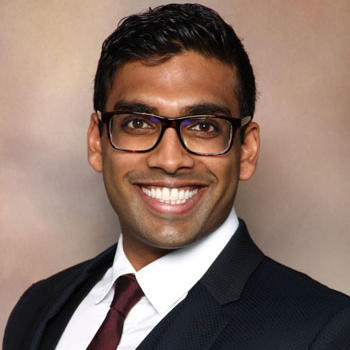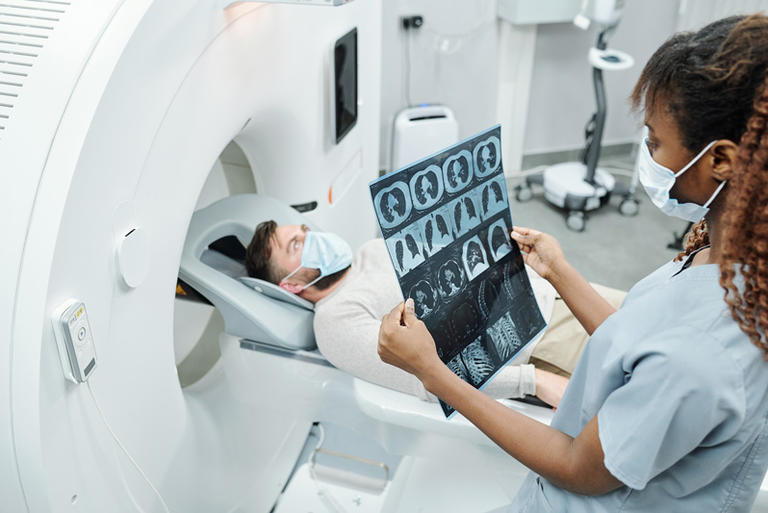There are some big differences between an ophthalmologist vs optometrist vs optician, and their training and qualifications also differ. Those differences will be explained below. Consider all the factors of each specialty, and then choose the one that suits you best. If you are uncertain which path to take, consider these questions:
- Do you want to be able to treat vision problems with surgery?
- Do you want to give eye exams and help people correct their vision?
- Do you want to work with doctors and fit people for glasses?
- Are you ready for nine or ten years of school and training?
- Do you want a faster track to a career in eye health care?
If you answer “yes” to any of these questions, a career in eye health care may be for you. Just choose a specialty path—and choose wisely.
Types of Eye Doctors
Every person will see an eye doctor at some point in their life, and many people see them on a regular basis. It is recommended that people have eye exams every one or two years. Age and health factors may force people to see eye doctors much more often. Eye exams ensure that you have the proper eye correction if needed, and they can also help diagnose and treat medical conditions in their early stages. A person who goes to an eye exam and gets corrective eyeglasses, contact lenses, or other ophthalmic devices may see one or all three of the eye professionals described here: ophthalmologists, optometrists, or opticians.
Only ophthalmologists begin their career at a four-year medical school—such as the Ross University School of Medicine (RUSM). There is a key difference between an optometrist vs ophthalmologist. Both types of eye doctors give eye exams and prescribe drugs, but optometrists go to a special optometry school to become doctors. An optician is not a doctor, but rather a technician, and a person must only pass certification exams to become one. The details of eye health care path are below, including the commitment it will take to become a professional in that specialty.
What Is An Ophthalmologist?
Ophthalmologists have either a Doctor of Medicine (MD) degree or a Doctor of Osteopathy (DO) degree before they complete four years of ophthalmology residency. They are “eye MD’s” as well as ophthalmologic surgeons who treat all diseases and disorders of the eyes. Ophthalmologists may provide corrective vision services (eyeglasses or contacts) or perform laser-assisted in situ keratomileusis (LASIK) or photorefractive keratectomy (PRK) surgeries to correct vision problems. They may also operate to treat such disorders as cataracts, diabetic retinopathy, glaucoma, macular degeneration, or strabismus (cross-eyes). Some ophthalmologists also do research on the causes and cures for eye diseases and vision disorders. Ophthalmologists may do an additional year or two of training to become subspecialists in such areas as:
- Anterior Segment Surgery
- Cataracts and Refractive Surgery
- Cornea and External Disease
- Glaucoma
- Neuro-Ophthalmology
- Ocular Oncology
- Ophthalmic Pathology
- Ophthalmic Plastic Surgery
- Pediatric Ophthalmology
- Vitreoretinal Diseases
Ophthalmologists are certified by the American Board of Ophthalmology, and they may apply for membership in the American Academy of Ophthalmology.
Meet an Ophthalmologist
Yogesh Patodia, MD, a 2017 graduate of RUSM, is an Ophthalmology Resident at University of Toronto in Canada. We asked Dr. Patodia to describe the role of an ophthalmologist.
Q: Why did you decide to go into your specialty?
A: Ophthalmology is such a unique specialty. We have the wonderful balance of having a medical and surgical practice so we can see our patients through their surgery and continue to follow them for long-term care. I may be a bit biased but the surgery is truly unparalleled. We perform microsurgery at the level of microns and require the utmost dexterity. I fell in love with ophthalmic surgery because of how artistic it was. Finally, we are one of the only fields that are on the forefront of technological advances. Year over year we see new technology being introduced to the field which really keeps things fun!
Q: Any advice to medical students considering the specialty?
A: Here are the things I did that (I think) helped me match.
- Get your name out early! I always tried to secure observerships with programs I was planning on applying too. This helped me get a bit of clinical exposure as well as build meaningful connections within a department.
- Research is extremely helpful and even something like a case report can go a long way.
- Show your passion for the field. If you're lucky enough to get an elective or an observership, be the first one there and the last to leave. Show your enthusiasm for the field and the willingness to constantly learn.
- Build connections and keep them over time. I was lucky enough to be involved in some research early on that allowed me to present at conferences. I would go up and introduce myself to key people I knew were involved in the program at these meetings and would follow up with them for research or observership opportunities.
Q: What’s the most rewarding part of your job?
A: Our patients see their results (quite literally). Seeing a person who just had a retinal detachment or a dense cataract go from 20/400 (the big E on the reading chart) to 20/20 or close to is probably one of the most rewarding parts of my field. I remember having a patient stop me in clinic to thank me for saving their vision. It wasn't until I went through their chart that I realized I saw them a month prior and repaired their retinal detachment. It is times like this that make you happy and proud of what you do. I have the pleasure of working with amazing staff physicians and support staff that make my residency experience amazing!
What Is An Optometrist?
Optometrists also treat diseases and disorders of the eye and visual system. An optometrist is one of the types of eye doctors, but they are not a medical doctor. They are a Doctor of Optometry (OD). OD 's provide primary eye care, giving eye health and vision examinations and prescribing eyeglasses and contact lenses, low vision rehabilitation, medications, and vision therapy. They may also remove foreign objects from a patient’s eyes or perform minor surgical procedures. Optometrists may treat dry eye or glaucoma, or they may monitor conditions in the eye related to diabetes and other diseases. But an OD’s principal task is to diagnose vision problems that affect a person's ability to see nearby and distant objects clearly and to judge distance. They also test the ability of the eyes to work together and to change focus easily. OD’s may counsel patients about surgical or non-surgical options, and they will often work with ophthalmologists and other specialists. After earning a bachelor's degree—typically in pre-med or biological sciences—optometrists complete a four-year Doctor of Optometry program. OD’s must then pass the National Board of Examiners in Optometry (NBEO) exams and obtain a license to practice. Optometrists may also do an additional year or two of training to become subspecialists in such areas as:
- Behavioral Optometry
- Geriatric Optometry
- Low Vision Therapy
- Neuro-Optometry
- Pediatric Optometry
Optometrists are certified by the American Board of Optometry, and they may apply for membership in the American Optometry Association.
What Is An Optician?
Opticians are technicians trained to design, verify, and fit eyeglass lenses and frames, contact lenses, and other devices to correct eyesight. They use prescriptions supplied by ophthalmologists or optometrists, but they do not test vision or write prescriptions themselves. Opticians use standard ophthalmic equipment, but they cannot diagnose or treat eye diseases. Formal schooling is not required to become an optician, but candidates must pass certain exams to be certified by the American Board of Opticianry. Anyone aged 18 years or older who has a high school diploma or GED may sit for ABO exams. No experience is needed, but candidates who have completed an optical school program or who have two or three years of hands-on experience are generally more successful in passing the exams.
If a career in eye health care appeals to you, there are several options. But if you want to be an ophthalmologist—which requires medical school—then the Ross University School of Medicine is a good place to start. RUSM has a strong history of placing graduating students in medical residencies. RUSM’s 2019-2020 first-time residency attainment rate was 95 percent. Take the next step on your path to becoming an ophthalmologist: apply for admission to RUSM.
Related resources:





